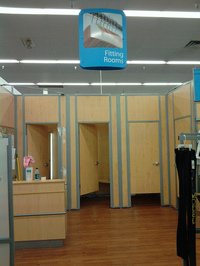How to Deal with a Shopping Addiction
Omniomania, compulsive shopping (or what's more commonly referred to as shopping addiction). What happens when shopping spirals out of control?
When most people hear the term "shopaholic" they picture someone sitting in a darkened room late at night watching the shopping channel with credit cards laid out in front of them, and a cell phone glued to their ear ordering 6 of everything. While seeing a shopaholic in that movie or on that television show may be amusing the real truth is shopping addictions are no laughing matter.
With close to 9% of the American population being compulsive buyers, shopping addictions are real and like other serious addictions they can cause a great deal of harm to the addict and those closest to them. Like all other addicts, shopaholics may manifest their addiction in individual ways. So how do you know if you are shopaholic?
Compulsive shoppers don't shop out of need, or occasionally spend a little more than they should. They use shopping as a way to self medicate when they feel sad, lonely, bored, or upset. Shopping gives them a "high" and makes them feel better for a short time. A bad day at work can send the shopaholic to an evening spent at the nearest mall. A fight with the spouse can have a shopaholic rushing to the nearest outlet or even thrift store.
Unfortunately, the high from shopping doesn't last long and is usually followed by depression as the compulsive shopper gets deeper and deeper into debt. It is unusually, for money fights with family members to erupt over the compulsive shoppers spending as calls from bill collectors and credit cards companies mount. Bill money and mortgage payments may go unpaid as the need to shop consumes one's life and oftentimes, shopaholics feel the need to hide their purchases to keep their loved ones from knowing just how much they are spending on shopping.
Who Is Likely To Become A Shopaholic?
More women become compulsive shoppers than do men, but the addiction can affect either sex. Many shopping addictions have their roots in childhood where money may have been tight and the shopaholic may simply not have had adequate food or clothing when they were growing up and now that there is more money or they feel in control they are self consciously making up for the past. This was seen in the years following the depression when thousands of people couldn't seem to stop buying and hoarding food.
Many people with a shopping addiction may have other addictions as well. Others only become compulsive buyers during the holiday season, while some buy compulsively on a daily basis and still others go on periodic binges for a day or even several days at a time.
Gaining Control Over Your Addiction
Like most addictions, gaining control over a compulsive shopping addiction is not easy and the first step in gaining some control over the addiction is to admit that you have a problem and that you can't seem to control your need to shop. Once you do that you can seek counseling or self help groups to help you with your fight to stop your damaging behavior. You may also need to see a credit counselor and a family counselor as well to help put your life back together and deal with the issues that have caused your addiction to begin with.
While getting some control over your urge to shop is going to be a long drawn out process, you are going to need to find some ways to control those shopping binges in the meantime. Here are a few things you can do.
- When you need to shop for food or other items make a list of only those things you need.
- Take only cash with you and only enough to buy those items on your list.
- Get rid of all those credit cards. They are most likely all overdrawn in the first place and getting rid of them will help you pay them down without continuing to add to them.
- Avoid those shopping shows on television
- Window shop only after all stores close, and never bring money with you when window shopping.
- If you feel out of control or feel the urge to shop, seek help immediately. Call a neighbor and go for a walk.
- Get involved in a project that makes you feel good about yourself, like working in a soup kitchen, or helping in a local school.
Beating a compulsive shopping addiction isn't going to be easy, but admitting that you have a serious problem and getting the help you need is the first step.
Shopping at the mall



Be the first to comment
OOTD Blog Posts
Fashion, Style News and Trends
 Kylie Jenner A Fashion Mogul?Kylie Jenner is a fashion icon. There is no debating that. Whether or not she is a fashion mogul is yet to be ascertained. The American model and entr...Read the rest of this fashion article.
Kylie Jenner A Fashion Mogul?Kylie Jenner is a fashion icon. There is no debating that. Whether or not she is a fashion mogul is yet to be ascertained. The American model and entr...Read the rest of this fashion article. Fitting Room EtiquetteFitting rooms, or as I call them, The AA Room (Addicts Anonymous Room, I will explain later) in clothing stores are not a requirement but are favorabl...Read the rest of this fashion article.
Fitting Room EtiquetteFitting rooms, or as I call them, The AA Room (Addicts Anonymous Room, I will explain later) in clothing stores are not a requirement but are favorabl...Read the rest of this fashion article. Should Your Boyfriend Like the Way You Dress?Lets face it, what girl doesn't like to dress good and look sexy from time to time. You occasionally like to dress in that low-cut top, short dress or...Read the rest of this fashion article.
Should Your Boyfriend Like the Way You Dress?Lets face it, what girl doesn't like to dress good and look sexy from time to time. You occasionally like to dress in that low-cut top, short dress or...Read the rest of this fashion article.Other Topics
 Why Sharing Your Clothes Is Not A Good IdeaMost people at one time or another has loaned a sibling, friend or a roommate an article of clothing from their wardrobe. In some cases, siblings or r...Read the rest of this fashion article.
Why Sharing Your Clothes Is Not A Good IdeaMost people at one time or another has loaned a sibling, friend or a roommate an article of clothing from their wardrobe. In some cases, siblings or r...Read the rest of this fashion article. How to Dress Like a RockstarDo you know how to dress like a rockstar? Well to dress like a rockstar you need to have lots of funky fashion. Don't be afraid to express yourself. e...Read the rest of this fashion article.
How to Dress Like a RockstarDo you know how to dress like a rockstar? Well to dress like a rockstar you need to have lots of funky fashion. Don't be afraid to express yourself. e...Read the rest of this fashion article. How Much Cleavage Is Too MuchBelieve it or not but breasts have etiquette's attached to them and in life, it is important for a woman to understand the whole concept of how much c...Read the rest of this fashion article.
How Much Cleavage Is Too MuchBelieve it or not but breasts have etiquette's attached to them and in life, it is important for a woman to understand the whole concept of how much c...Read the rest of this fashion article. Ashley Benson's Fashion Sense
Ashley Benson is an up and coming actress from the popular ABC television series pretty little liars. Ashley Benson plays Anna Marin a popular 'it...Read the rest of this fashion article.
Ashley Benson's Fashion Sense
Ashley Benson is an up and coming actress from the popular ABC television series pretty little liars. Ashley Benson plays Anna Marin a popular 'it...Read the rest of this fashion article. Everything you need to know about Big Baller BrandBig Baller Brand, trademarked as BBB, is an apparel and footwear company based at Chino Hills, California in the United States. The private company wa...Read the rest of this fashion article.
Everything you need to know about Big Baller BrandBig Baller Brand, trademarked as BBB, is an apparel and footwear company based at Chino Hills, California in the United States. The private company wa...Read the rest of this fashion article. When did Guys wearing Skinny Jeans become Acceptable?Not too long ago, skinny jeans were completely rejected by men, including fashion designers. Even today, skinny jeans are not generally approved of or...Read the rest of this fashion article.
When did Guys wearing Skinny Jeans become Acceptable?Not too long ago, skinny jeans were completely rejected by men, including fashion designers. Even today, skinny jeans are not generally approved of or...Read the rest of this fashion article.















